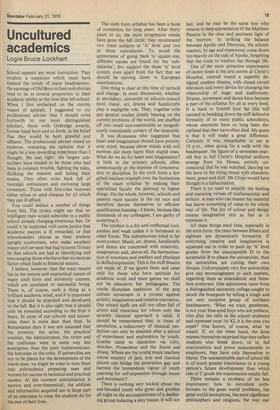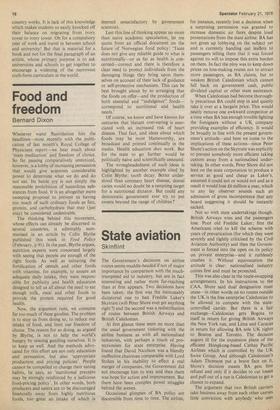Uncultured academics
Lowe Bruce Lockhart
School appeals are most instructive. They confirm a suspicion which must have entered the minds of many headmasters : the earnings of Old Boys in their mid-thirties tend to be in inverse proportion to their academic ability at the time they left school. When I first embarked on the stormy waters of appeals, I suggested to my professional adviser that I should write forthwith to our most distinguished scholars, those with Oxbridge awards, former head boys and so forth, in the belief that they would be both grateful and affluent. The professional adviser raised an eyebrow, venturing the opinion that it might be a less rewarding experience than I thought. He was right: the largest subscribers have tended to be those who had been in constant trouble, fighting the rules, disliking the masters and failing their exams. They often write back full of nostalgic enthusiasm and enclosing large covenants. Those with first-class honours either refuse or send cheques for E5 which they can ill afford.
You could deduce a number of things from this. The cynics might say that no intelligent man would subscribe to a public school already charging enormous fees. Or could it be supposed with some justice that academic success is ill rewarded, or that schoolmasters choose as their prefects upright conformers, who make excellent minor civil servants but bad tycoons ?It may be that schools are bad at identifying and encouraging those who have that mysterious factor which leads to financial success.
I believe, however, that the main reason lies in the remote and unpractical nature of many sixth form and university courses, which are unrelated to successful living. There is, of course, such a thing as a brilliant academic mind, and it is important that it should be stretched and developed to the full. But it is also right that it should only be rewarded according to the fruit it bears. In some of our schools and universities there is more dust than fruit. In Renaissance days it was not assumed that the inventor, the artist, the practical' scientist, the administrator, the writer and the craftsman were in some way less prestigious than the pure mathematician, the historian or the critic. If universities are not to be places for the development of the whole man, we might be wiser to turn them into polytechnics preparing men and women for success in technical and practical careers. At the moment specialisation is narrow and over-theoretical; the abilities and information acquired are in large part of no relevance to what the students do for the rest of their lives. The sixth form syllabus has been a bone of contention for long years. After thirty years or so, the most progressive minds have gone the full circle; they recommend two main subjects at 'A' level and two or three subsidiaries. To avoid the appearance of going back to square one, different names are found for the 'subsidiaries'; few support the three `A' level system, even apart from the fact that we should be moving closer to European examinations.
One thing is clear at this time of turmoil and change : in most discussions, whether at secondary, university or schools council level, music, art, drama and handicrafts play a negligible role. They, together with any general studies closely bearing on the current problems of the world, are shuffled off into small non-examinable or insignificantly examinable corners of the timetable.
It was [Rousseau who suggested that heart and imagination should have priority over mind, because clever minds with evil motives did more harm than stupid ones. What do we do for heart and imagination? A little in the primary schools, often unnecessarily at the expense of concentration or discipline. In the sixth form a few gifted teachers triumph over the limitations of the exam syllabus by making their specialised faculty the gateway to higher things. On the whole, however, schools and parents want success in the rat race and therefore devote themselves to efficient qualification hunting—I know, because like thousands of my colleagues, I am guilty of accepting it.
The intellect is a dry and ineffectual tool, aimless and weak unless it is harnessed to other forces. The subconscious mind is far more potent. Music, art, drama, handicrafts and dance are concerned with creativity, imagination and, above all, the harmonisation of emotions and intellect and physique in skilled expression. This is the stuff dreams are made of. If we ignore them and cater only for those who have aptitude for academic work and team games we shall not be educators but pedagogues. The whole dionysian explosion of the pop culture movement is a protest against artistic, imaginative and creative starvation. Our school staffs are still too often full of artists and musicians for whom only the severely classical approach is valid. It should be remembered that, in times of revolution, a rediscovery of classical perfection can only be attained after a period of experiment and exploration by youth. Goethe came to classicism via Gotz, Werther, Prometheus and the Sturm und Drang. Where are the young music teachers whose mastery of jazz, pop and classical idioms can bridge the generation gap and harness the tremendous vigour of youth yearning for self-expression through music and movement ?
There is nothing very wicked about the red-blooded youth who gyres and gimbles all night to the accompaniment of a deafening group inducing a sexy trance. It will not last, and he may be the same boy who returns to deep appreciation of the Matthew Passion in the clear and pertinent light of the morrow. In striking the balance between Apollo and Dionysus, the schoolmasters, by age and experience, come down too heavily on the side of Apollo, forgetting that the route to wisdom lies through life.
One of the most attractive experiments of recent times is the arts centre at Christ's Hospital, centred round a superbly designed modern theatre, with closed circuit television and every device for changing the relationship of stage and auditorium. Drama, movement and dance have become a part of the syllabus for all at every level. It is hard to foretell how far this will succeed in breaking down the stiff defensive formality of so many public schoolboys, whose emotions have so long been disciplined that they have often died. My guess is that it will make a great difference. Certainly it was remarkable to see at 10 p.m., when going for a walk with the headmaster, the figure of a seventeen-yearold boy in full Christ's Hospital uniform emerge from his House, entirely unconscious that he was watched, dancing on the lawn to the rising moon with abandonment, grace and skill. Mr Chips would have thought it a hallucination.
There is no need to amplify the healing and maturing virtues of craftsmanship and artistry. A man who can master his material has learnt something of value to his whole way of life. The joy of colour and design creates -imaginative zest as fast as it expresses it.
All these things need time, especially in the sixth form: the years between fifteen and eighteen are dynamically formative. If everything creative and imaginative is squeezed out in order to push up `A' level grades from the unacceptable D to the acceptable B to please the universities, then the universities are cutting their own throats. Unfortunately very few universities give any encouragement to such matters, regarding them as unacademic and therefore irrelevant. One admissions tutor from a distinguished university college sought to shock the bourgeois by telling a tough and not very receptive group of northern headmasters : `What we want, gentlemen, is not your blue-eyed boys who are prefects, who play the cello in the school orchestra and represent your 1st XI, it is the ones you expel!' One knows, of course, what he meant. If, on the other hand, the dons express themselves surprised that they collect students who break down, sit in, fail examinations and prove unacceptable to employers, they have only themselves to blame. The unexaminable part of school life is of much greater importance to a young person's future development than which side of C grade the examination results fall.
There remains a problem of no less importance: how to introduce sixthformers to the great world problems, the great world institutions, the most significant philosophers and religions, the way our country works. It is lack of this knowledge which makes students so easily knocked off their balance on migrating from ivory tower to ivory tower. Oh for a compulsory year of work and travel in between school and university! But that is material for a book and not for the final paragraph of an article, whose primary purpose is to ask universities and schools to get together to encourage a widening of the narrowest sixth-form curriculum in the world.



































 Previous page
Previous page